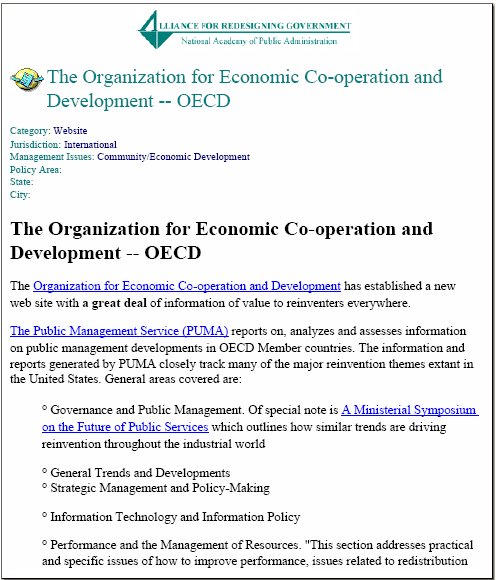REINVENTION OF AMERICA
- Part 5c
The Jigsaw Puzzle
What happened to our government between 1990 and today is a jigsaw puzzle, the pieces of which I am putting together for you. Our government has been gutted from the inside out leaving behind the facade of the American government but it's obvious from the policies and legislation coming out of Washington DC that federal government is not American.
Article recovered from the Alliance
for Redesigning Government website:
|
|
||
|
|
This is a synopsis of the report on the inaugural conference of CAPAM, the Commonwealth Association for Public Administration and Management. Held in Charlotte, Prince Edward Island, Canada, in August, 1994, Government in Transition was the first gathering of public administrators from the 51 nations that comprise the Commonwealth. The Commonwealth has a population of 1.5 billion and is experiencing unprecedented political and social transitions: from single to multi-party systems, from national to regional sovereignty, from closed to open economies, from decreasing to exploding populations, and from apartheid to democracy. Despite the diversity of Commonwealth countries, there is a pattern in their responses to changes. CAPAM believes that these patterns and transitions represent a new paradigm in public administration and hold the promise of greater freedom of political expression and improved material well-being. ...There are,
however, some lessons learned about the organizational dynamics that are
...The report goes on to discuss the societal context of public management. Are successful reform initiatives replicable across a variety of societies? Using the OECD countries, the Asian tigers (Singapore, Malaysia and Hong Kong) and the developing countries, the conference participants examined those issues. In the OECD countries, economists and politicians were the driving force for public management reform. Their policies -- particularly the use of market mechanisms and the increasing role of the private sector -- remain controversial in the public management community. The three countries that have most fervently embraced these new paradigms are now rediscovering the virtue of old values. Australia is now implementing a "new professionalism" in its civil service. New Zealand has reiterated the collective interest of government relative to departmental autonomy and the UK has reasserted the importance of the civil service's role as policy advisor. |
|
|
|
||
Why would "some kind of shock" be needed to force change and what kind of change are they talking about? Obviously, if your intent is to implement global systems of "governance" run by professional managers trained in a communitarian system of mind control, people are going to object. When their history, heritage and culture are being erased or changed for no apparent reason - or for reasons that make no sense, they will try to stop it. When the communitarian managers hit a roadblock, they blow it up... and then use "terrorism" as the excuse for the change they wanted to implement anyway. And we are seeing these changes everywhere - and nowhere. Everywhere because our systems of government are changing - and nowhere because the changes are administrative from the bowels of government and our institutions. To find these communist bast*rds, we have to look at the administrative levels of government and at their front-group NGO change agents.
Since this document references the OECD, we'll look at them first. It should be noted the information below was recovered from the Internet Archive. The current OECD website has different pages with this information but for my purposes, the archived versions were better.
Organization for European Co-Operation and Development (OECD)
|
|
|
|
|
|
||
OECD Membership as of about 1999
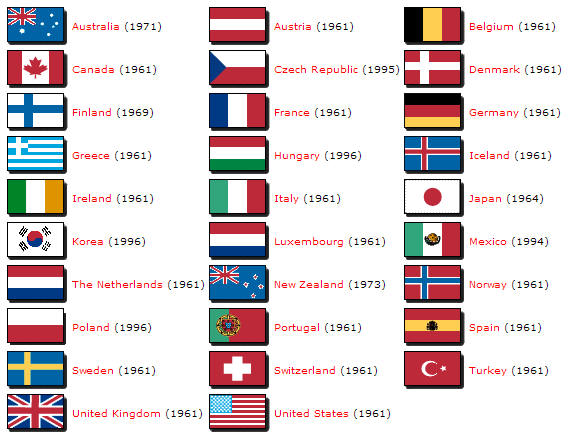
At this
point if you have been observant, you might be saying, the document
above that was posted on the National Academy of Public Administration -
Alliance for Redesigning Government website, attributes the idea of
"shock" - (terrorism as a tool for change management), to
the Commonwealth Association for Public Administration and Management
but note the date of the establishment of
CAPAM.
|
|
||
|
|
CAPAM was
established in 1994 to facilitate the exchange of information and
knowledge on |
|
|
|
||
CAPAM was late
to the party. The OECD, Public Management Committee and
Public Management Service (PUMA) was formally organized in 1990.

|
|
||
|
|
Committee and the Public Management Service. The Committee shapes and directs the PUMA work programme and meets every March and October. The work programme is carried out by the PUMA Secretariat in collaboration with specialist groups of senior managers who meet once a year on average.
|
|
|
|
||
What happened in 1990 to trigger the establishment of PUMA? The decisions made at the G8 Summit in Houston, Texas concerning the Soviet Union, the global economy and the OECD recommendations:
|
|
||
|
|
|
|
|
|
||
1991, Senator Al Gore succeeded in getting
the High
Performance Computing Act of 1991 passed and signed into law.
This legislation opened the nation's telecommunications system
(Internet) to the public for personal and business purposes.
The opening of the telecommunications system made possible for the first
time, global "governance".
By 1995, they
were ready to begin the project for "global governance".
|
|
||
|
|
Building Global Infrastructure for a Real Information Society February 21, 1995, New York Times When policymakers gather this coming weekend for the Group of Seven Ministerial Conference on the Information Society, their very presence in Brussels will send an important message to the rest of the world: Governments understand that they have a key role to play in facilitating the development of a global information infrastructure (GII). In many respects, tomorrow's information highways are already here. On the campuses of major corporations, large research universities and government laboratories, broad-bandwidth pipelines for carrying digitized information are already commonplace. To build on these technological developments, I believe that the public and private sectors must jointly address a number of challenges at the first-ever meeting on the information society. How do we transform this sprawling network of networks into a global information infrastructure? And, more importantly, how do we become a "true" information society where the benefits of technology can be enjoyed by all? The potential benefits of creating a GII are enormous. As this infostructure evolves, there will be increased jobs, productivity and competitiveness. As information technology becomes ever more widely available and accessible, a better standard of living will be realized. |
|
|
|
||
|
|
||
|
|
June 16, 1995, G7/G8 Halifax Summit Communiqué, Growth and
Employment GROWTH AND EMPLOYMENT 7. Good fiscal and monetary policies will not on their own deliver the full fruits of better economic performance. We must also remove obstacles to achieving the longer-term potential of our economies to grow and create secure, well-paying jobs. This will require measures to upgrade the skills of our labour force, and to promote, where appropriate, greater flexibility in labour markets and elimination of unnecessary regulations. At Naples we committed ourselves to a range of reforms in the areas of training and education, labour market regulation and adjustment, technological innovation and enhanced competition. As we pursue these reforms, we welcome the initiation by the OECD of a detailed review of each member economy's structural and employment policies. 10. We welcome the results of the G7 Information Society conference held in Brussels in February, including the eight core policy principles agreed to by Ministers, and encourage implementation of the series of pilot projects designed to help promote innovation and the spread of new technologies. We also welcome the involvement of the private sector. We encourage a dialogue with developing countries and economies in transition in establishing the Global Information Society, and welcome the proposal that an information society conference be convened in South Africa in spring 1996. Strengthening the Global Economy 14. The growth and integration of global capital markets have created both enormous opportunities and new risks. We have a shared interest in ensuring the international community remains able to manage the risks inherent in the growth of private capital flows, the increased integration of domestic capital markets, and the accelerating pace of financial innovation. 22. Closer international cooperation in the regulation and supervision of financial institutions and markets is essential to safeguard the financial system and prevent an erosion of prudential standards. We urge: to developing and enhancing the safeguards, standards, transparency and systems necessary to monitor and contain risks; continued encouragement to countries to remove capital market restrictions, coupled with strengthened policy advice from international financial institutions on the appropriate supervisory structures; |
|
|
|
||
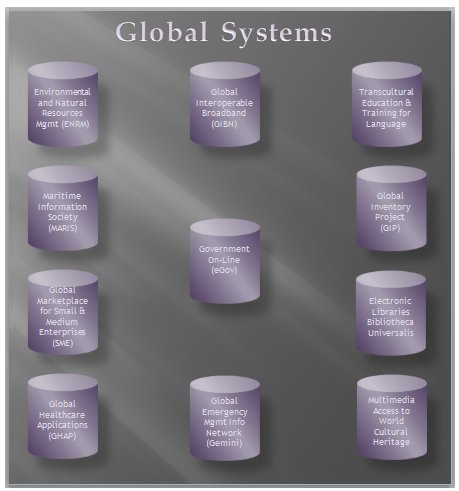

THE
GLOBAL INFORMATION INFRASTRUCTURE: AGENDA FOR COOPERATION
Chair, Information Infrastructure Task Force
Larry Irving, Administrator
National Telecommunications and Information Administration
U.S. Department of Commerce
Chair, IITF Telecommunications Policy Committee
On the current OECD, this is what they claim they do. Sounds innocuous doesn't it?
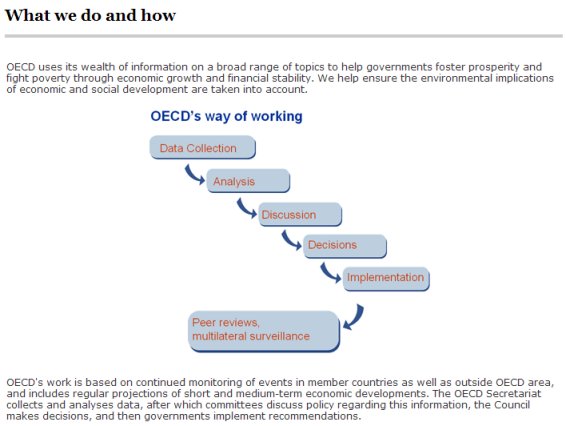

1996 Paris Ministerial Symposium
on the Future of Public Services

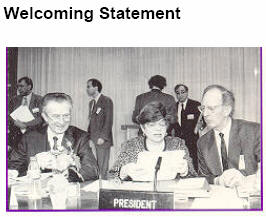
"The art of government has
never been a simple one, and today it is perhaps becoming still more
difficult. That is why OECD has concerned itself with public management"
Click here to read the Statement by the Chair, Hon Alice M. Rivlin
left to right:
Jean-Claude Paye OECD, Secretary-General
Hon Alice M. Rivlin United States, Chair of the Symposium
Derry Ormond OECD, Head of the Public Management Service
Alice Rivlin
Jan. 1993 – Oct. 1994
Deputy Director OMB, The White House
Oct. 1994 – June 1996 Director OMB, The White House
June 1996 – July 1999 Vice Chair Board of Governors, Federal Reserve
System
White House Press Briefing 3/27/95
OMB Director Alice Rivlin,
Senior Policy Advisor to the Vice President Elaine Kamarck,
Secretary of Interior Bruce Babbit,
FEMA Administrator, James Lee Witt,
NASA Administrator Dan Goldin,
SBA Administrator Phil Lader and
FCC Commissioner Reed Hundt

Alice Rivlin
Bipartisan Policy Center
MR. MCCURRY: Good afternoon, everybody. I think many of you attended our event earlier today, but I wanted to have some of the key participants to give you a little more detail. So I've asked Alice Rivlin, who is the Director of the Office of Management and Budget, and Elaine Kamarck, who is Senior Policy Advisor to the Vice President and has been working with the Vice President on reinventing government to start off today; and then also to introduce some of the other agency heads that will be participating....MORE

Elaine Kamarck,
Liar
Recording of Elaine Kamarck talking about
'End of Government As We Know It'; 2007 American Solutions
(Newt Gingrich's org)
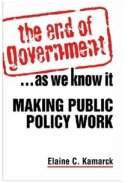
Back to the Alliance for Reinventing Government -
OECD Conference in June of 2000 - See Page 7, Al Gore Letter
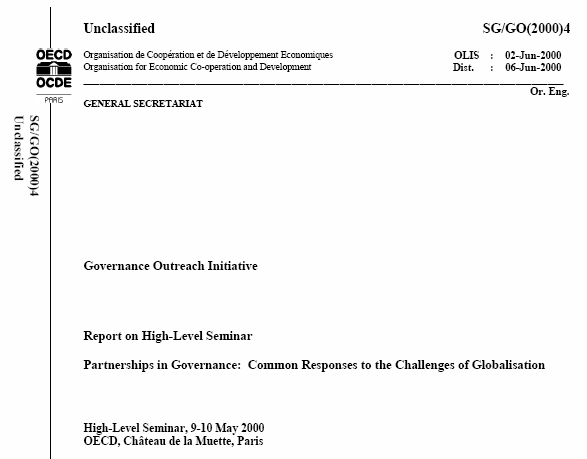
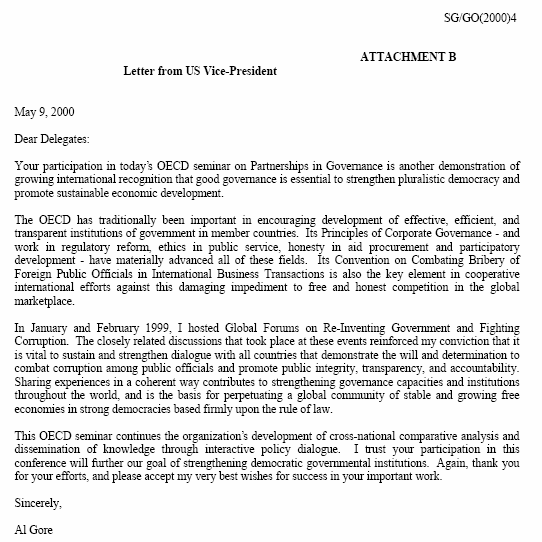
I don't know if I ended up showing you what I wanted to show you or not. I have so many documents and the documentation can go in so many different directions - all extremely important. The bottom line is that what these people did was to consolidate the systems of government. This is a consolidation of the power of government. At the same time, they externalized governing - elimination of government employees, contracting out the functions - leaving the administrative levels as contract administrators for profit-making corporations and NGO's. The policy-making functions have been internationalized. Policy is passed down from the global level through fascist "thought leaders" like those at Harvard who then "Americanize" it and package it for Congress to pass the framework legislation. And it's not just the American government that has been taken over. It's the governments in all the developed countries. Obviously, this is not the form of government that any intelligent, rational person would choose. It's the government of, by and for psychopaths.
To prove what
I'm saying, all you have to do is to consider the provisions of the
recently passed
S.510 Food Modernization Act. It was first (to my
knowledge) proposed by Secretary of HHS Michael Leavitt.
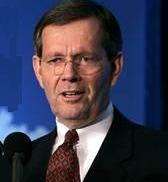
What 'field to table' means is that the government is essentially taking over management of your farm operation and your assets have been incorporated into the supply chain which is controlled by big business.
Leavitt Speech Part 1 (~ 30 min)
(mp3's)
Leavitt Q&A Part 2 (~ 20 min)
In the European Union, they are a little more open about what is being done because they know their national governments are being disintegrated by the European Union. On the OECD - Public Management Committee and Public Management Service (PUMA) website.
I can't seem to get back to the website through the archive today, but fortunately, I captured several of the "Cow to Kid" pages.
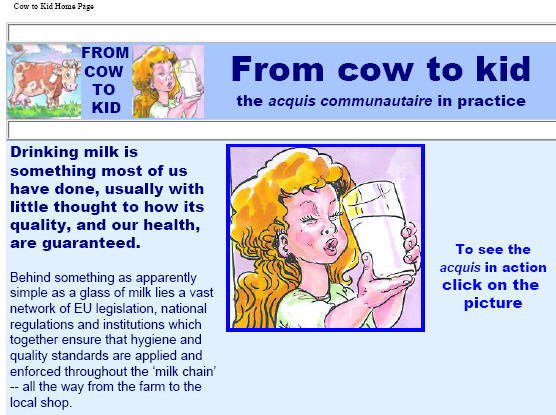
Reorganized Governing
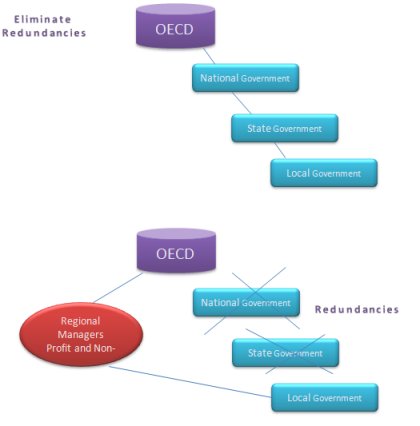
Go back and look at Ted Gaebler, Slide 12
December 27, 2010

